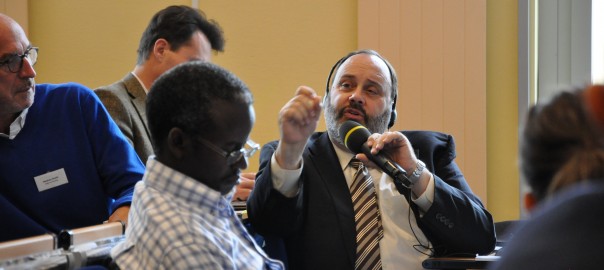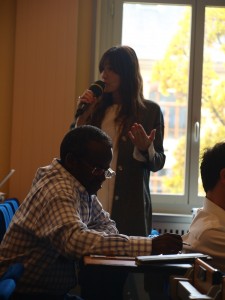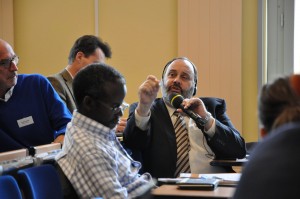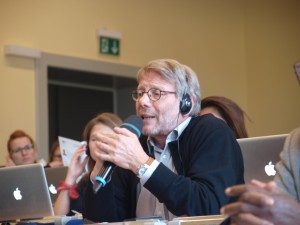Media development and sustainability in Africa
Only a challenge or an opportunity, too ?
International Conference, held on October 22-23, 2015
University of Neuchâtel, Switzerland
Objective
The conference aimed at drawing attention to the major constraints and enablers for media development in different regions of Africa. In particular, debates focused on the factors that could help fill the financial and competence gaps, as well as to strengthen the impact of international aid on the durability of media firms.
On October 22, international researchers presented their latest studies on the topic.
On October 23, prominent journalists, researchers, media professionals and representatives of nongovernmental organizations (NGOs), intervened and mainly discussed on economic and educational issues related to media development. The recent expansion of Western media companies in Africa gave us the opportunity to reflect on the impact that an emerging continent like Africa can have on the business model not only of African media, but of Western media, too.
You can find further details about the content of the conference below, or on the university site.
A selection of papers presented at the academic workshop has been published in a special issue of the Journal of Media Business Studies and can be found here.
Organizing Committee
Cinzia Dal Zotto, with Evgeniya Kolpakova and Yoann Schenker – Academy of Journalism and Media & Enterprise Institute, University of Neuchâtel
- Scientific Partners – Swiss Association of Communication and Media Research (SACM), International Media Management Association (IMMA) and European Media Management Association (EMMA)
- Professional Partners – Fondation Hirondelle, in occasion of its 20th anniversary
- Sponsors: University of Neuchâtel, Ringier, Radio Television Suisse (RTS), SACM
Moderator: Peter Rothenbuehler, independent journalist and partner at Rampazzo & Associates
Introduction
Cinzia Dal Zotto, Professor of Media Management at the University of Neuchâtel
The importance of independent and pluralistic media
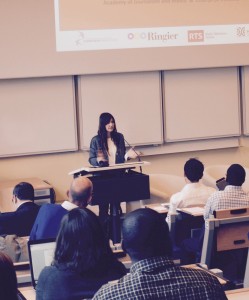
Free and independent information media are fundamental for both the economic and democratic development of countries. In Africa – and particularly in conflict zones – at the moment media development is mainly being supported by international donors and non-profit organizations. They provide initial investments to help stabilize countries and support their transition toward democracy or out of war. After a certain level of success is perceived, donors and organizations either lower their support or withdraw completely. The sustainability of media in the long run is therefore one of the biggest problem for developing democracies to solve.
Furthermore, donor interventions have emphasized training, but much less so the creation of institutionalized structures for educating journalists, media business managers, and audience researchers over the long term. Among the five objectives that according to the media sustainability index are deemed to enable a media system to be independent and sustainable, the one measuring if “media are well managed, allowing editorial independence” scores the lowest. Probably, a new approach to African – and probably not only African – journalism is needed both in terms of financial support as well as educational programs. It is therefore worth considering what factors might help strengthen long-term impact on media sustainability of the various support measures that are put in place.
Africa is a huge continent with 54 countries, more than 500 different languages, a rapidly developing telecommunications network infrastructure but hardly accessible and thus highly unconnected rural areas. Within this context the development and sustainability of independent media is not granted nor an easy task.
Foreign direct investment can be of help. Further, a diversified coverage of topics and sources, both domestic and foreign, should be ensured to introduce news consumers to new perspectives. In the last few years we have seen quite a few established media firms from developed countries expand their business activities in Africa (Le Monde Afrique, Ringier, Canal+, Lagardère, Slate, Quarzt, BBC, Bloomberg just to name a few). These actions potentially foster media pluralism and transparency on one hand, as well as innovation and economic development on the other hand. However, in order to ensure a truly pluralistic perspective on the African continent the existence of sustainable and independent local media is needed.
A first discussion between researchers and practitioners in the field around this topic took place at an international conference held at the University of Neuchâtel last October 22-23.
Research Results from the International Academic Workshop on October 22, 2015
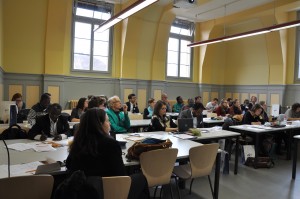
This event gathered scholars coming from various African countries as well as from Europe, the US and Asia. Results point out that for instance in Nigeria (a) the broadcasting media sector is predominantly controlled by government-owned enterprises, which are the only ones to have a national coverage (b) print media are mostly privately owned, but investors often have vested interests in national politics or close ties with political leaders in the country, (c) a nationally structured network of distribution for daily newspapers is absent, (d) the advertising market is characterized by a high buyers’ concentration. These issues limit competition and media pluralism as well as professionalism and the sustainability of an independent news media system.
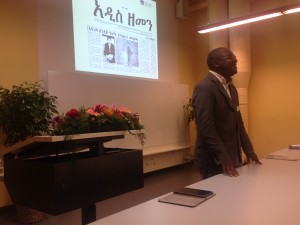
Further, it appears that media and journalism programs at university are not in line with the reality of media convergence and the needs of an evolving digital media industry. Research highlights the success of some community media in Uganda and Tanzania, and argues that focusing on local language programming and community agendas might be a sustainable business model for independent African media, once donors’ funding withdraws. Unfortunately the advertising market is far from being developed, audience research is lacking and journalism schools do not offer any local language based programs.
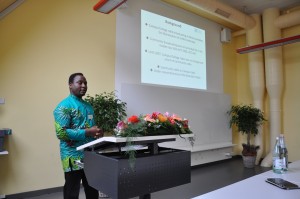
Summing up, main issues threatening or not allowing independent media development and sustainability in Africa appear to be (1) the lack of competence (both at journalistic and management level), (2) a not sufficiently or broadly developed telecommunications network infrastructure, (3) the existence of a multitude of local languages making it difficult for media to scale, (4) the lack of measures to address and broadly develop the advertising market as base to finance independent media.
After peer review, the best papers presented at this workshop have been published on a Special Issue of the Journal of Media Business Studies (Volume 14, Issue 1).
Contributions to the International Professional Conference on October 23, 2015
Those very same issues have been the object of discussions at the International Professional Conference that took place on October 23 and that included the contributions of media professionals, representatives of the donor community and media companies, beyond those of the research scholars that participated to the academic workshop on October 22. Debates have been very enthusiastic and engaged. Some extracts of the contributions to the conference follow below.
Keynote
Factors affecting sustainability of media in developing countries
Robert G. Picard – Reuters institute, University of Oxford
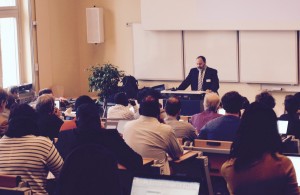
Until now the broader media development efforts focused on developing effective communication infrastructures, legal and regulatory systems, media ownership, as well as media education and professionalism. Although these are common issues, according to Picard, it has become progressively clear that those alone cannot produce media development because media face additional sustainability issues that require significant emphasis on the economic and business aspects of sustainability.
A reflective review of media development programs from the past half century leads, Picard says, to a number of conclusions about their efficacy:
- Media training courses and media operations established with aid from development programs have managed to produce primarily short-term rather than long-term results.
- Western development agencies and programs have tended to pursue media development efforts that support their home nations’ immediate foreign policy objectives rather than longer-term development objectives.
- Many media development efforts have sought to replicate media forms and practices found in developed countries, without fully recognize wide differences in the relative importance of media types in varying locations. What is worse is that there is an effort to recreate media types and systems that are declining and failing in the developed world.
- There has been an overemphasis on developing commercial media, overstating their independence from government and elites, which has tended to promote mid- and large-sized profit-making media firms rather than other forms and sizes of media, such as community operated and supported media.
- Teaching western journalism norms and practices has widely failed to yield improvements in journalism in many regions because they have not accounted for their social and cultural realities.
These and other challenges has led to a major shift in media development efforts during the past decade, with greater emphasis being placed on increasing the economic and business viability of media and related capabilities in their staff. This shift became evident when UNESCO began revisiting its model curriculum for journalism education in developing countries in 2012, Picard says. The new curriculum sought to give journalists and media firms knowledge about how to improve the environment in which they operate and to engage in strategies and practices that promote media sustainability. This action represented a shift in thinking and a change of focus away from political and social system concerns to economic system concerns. Within such action Picard, together with Deutsche Welle Akademie and other media experts, worked on developing indicators involving economic, financial, and managerial factors required to ensure sustainable independent and pluralistic commercial and non-commercial media.
Picard concludes with some questions to consider as the debate moves forward:
- are we focusing on the right types and sizes of media? Are we ignoring media that might more effectively serve the needs of local population?
- Is it wise to develop media in Africa that take institutional forms currently struggling to survive in Europe and North America?
- What are the domestic consequences of promoting foreign direct investment in African media? What forms are more or less helpful in promoting sustainability of domestic media?
Keynote
Facts and figures of audiovisual media development in Africa
Sylvain Béletre, Balancingact_Africa.com
Sylvain Béletre, audiovisual market analyst at Balancing Act, explained that it is really very difficult to have data on Africa, in particular considering that 90% of the economy is underground. Currently population on the African continent counts 1.1 billion inhabitants, a number which is expected to grow to over 2 billion by 2050. At that time 700 million inhabitants will be French-speaking, and 85% of them will be in Africa. These figures, together with the rapidly expanding telecommunication network infrastructure, explain the substantial engagement of established French media firms in Africa.
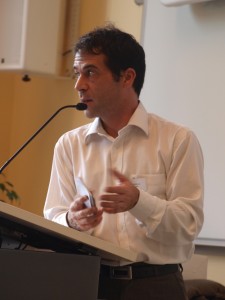
TV channels
Béletre continues focusing on facts and figures of the TV broadcasting sector. According to the latest reports from Balancing Act, there is a continuous growth of the number of free to air (FTA) and pay TV networks, broadcast either via satellite or terrestrially. For the terrestrial FTA TV channels: in 2010 they were about 590, while in 2015 they are 710 – 100 of which are in the Democratic Republic of Congo and 120 in Nigeria. The number of satellite TV channels increased as well to more than 2200. The main operators are Eutelsat, the American Intelsat and SES based in Luxemburg. Among the francophone network, Béletre recalls Canal+ with 1.7 million subscribers and TV5 Monde with an audience of 14 million households across the continent. Among new TV entrants there are now Nollywood TV, Africanews (due to start Jan. 2016), CCTV (french version), Trace TV channels, Zeemagic, Gospel TV, i24news, and many more.
Pay TV
As for the pay TV segment, according to Béletre, there are over 50 platforms in Africa. The top 8 are the following: (1) DStv-GOtv, belonging to Naspers, (2) Startimes, (3) Canal+, (4) Zap and Zon in lusophone countries, (5) Azam Tv in Tanzania, (6) OSN, (7) Excaf in Senegal which has recently launched digital terrestrial TV, (8) Zuku TV in East Africa which also offers broadband and telephone services around Nairobi. The initial number of people with access to pay TV in Africa was around 6 million in 2010, while 17 million subscribers are expected by the end of 2015. Projections reach 38 million in 2018 and 47 million in 2020 with revenues reaching US$ 2.8 billion.
Video on Demand
Balancing Act further counted over 120 platforms for Video on demand (VoD) services related to African content, including operators that produce and distribute content, TV networks that offer this service and telecoms service providers. Traffic data for YouTube, which appears to be the first VoD operator in Africa, is available from the platform itself. The second VoD operators are Iroko TV and Naspers’ VoD solutions, which count 600.000 transactions/month.
Digital Terrestrial TV
Last but not least Béletre points out figures related to digital terrestrial television (DTT). So far 6 (and soon 7) African countries have launched DTT (Kenya, Morocco, Namibia, Mauritius, Rwanda, Tanzania and soon Malawi) and have started to cut analogue TV off (ASO, analogue switch off). Another 16 countries are running digital alongside with analogue TV, while 12 countries are preparing to launch DTT soon, and a further 12 are late. 10 countries are not taking any action in this respect. Leaders in the DTT sector are Startimes and GoTV. Startimes is operational in 16 countries and has about 6,5 million clients in Africa, while GoTV covers 10 countries and has about 2 million clients. The total number of clients to DTT in Africa today is over 9 million.
Sylvain Béletre specified that in order to launch a digital TV service in a country you need an initial capital of at least US$ 10 million (for key cities). The amount obviously depends on the size of the country and on the presence of subsidies. In Nigeria $ 400 million are needed, while the average amount is $ 127 million/country. Costs include expenses for technical equipment, content acquisition, marketing communication as well as budgets for post-sale services (POS and call centers). One of the main problems for setting up digital TV services in Africa is related to content quality and appropriateness. The switch to digital TV is important not only to broadcast TV content but also to allow frequency and spectrum space for 4G-LTE mobile services.
Content is king
Béletre closed by adding that sales of Africa-related content has grown enormously over the past 5 years, mostly thanks to the rise of Nollywood, the setup of new studios and production houses, technical training, the vibrant South-African audiovisual industry and of a new generation of young, talented African film makers from all over the continent.
Discussion Panel
Educational challenges for media development in Africa
Panelists
- Jean Marie Etter, Fondation Hirondelle, Switzerland
- Antoine Laurent, Digital Innovation Press Fund, France
- Paulo Faustino, International Media Management Academic Association, Portugal
- Robert G. Picard, Reuters Institute, University of Oxford, UK
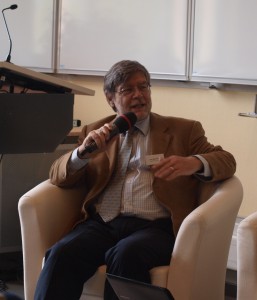
Jean Marie Etter pointed out that the most widely present media in Africa are radio and TV, which are developing at high speed in urban zones. Online and 4G mobile media are rapidly emerging in urban zones, too. As in conflict zones the economic context is not favorable to allow media development, the Hirondelle Foundation operates to ensure the creation of independent institutions for the diffusion of information. The sustainability of these institutions is thus one of the main challenges, says Etter. The Foundation contributes to media development also with training activities and has at the moment training centers in Guinea, Ivory Coast and Democratic Republic of Congo.
QUESTION
Do African journalists want to improve their competences, is there demand for media training ?
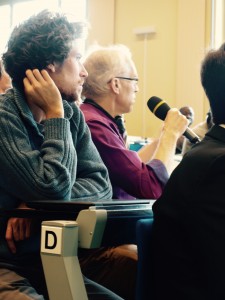
Yes, says Jean Marie Etter, we are very solicited by African journalists asking for media training. Training itself is not the problem. You will always find people willing to acquire and improve their journalism skills, and resources to provide media training are there. The problem is represented by media firms that very often are not a place in which journalists can conduct good journalism. Managerial skills as well as appropriate revenue and business models adapted to the African economics and social system are lacking. In particular management competence is lacking and if you need 2-3 years to properly train a journalist, training a good manager might takes 5, 10 or even 20 years. Neither donors nor investors reflect on this.
A further problem is represented by the application of the deontology that we, as Fondation Hirondelle, propose as base for journalism professionals in Africa, continues Etter. Journalists embrace this deontology but applying it is a completely different story. Applying this deontology in many parts of Africa makes you part of a minority and might create difficulties for journalists to earn money. It is thus very important to distinguish between what you can learn through training and what you can finally apply.
QUESTION
Is the need higher for training in the area of journalism or media management?
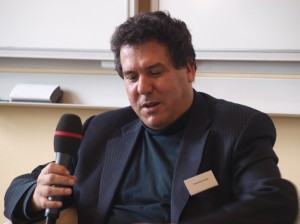
According to Paulo Faustino, who has been teaching in various media and journalism programs within Portuguese-speaking African countries, media is mostly perceived as a cultural product. Thus, media management is not a priority training area yet. Further, most media are state owned and, because of unfavorable economic and geographical conditions, entering the market for independent media is very difficult. Thus, in Portuguese speaking countries the approach to education and training still refers either to journalism or technology programs.
Picard disagrees. The situation was the same in Europe about 30 years ago. Now you have good media management education programs all across Europe. When countries stabilize, then they ask how they can become more efficient, Picard says. Antoine Laurent adds that digital training is also very much demanded in Africa. To respond to this demand,
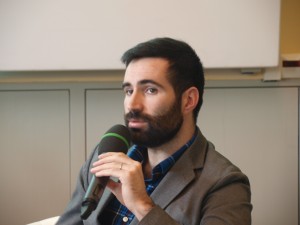
Code4Africa – an African organization providing digital training and with which he collaborates – creates associations and events in the style of Hack Hackers and aims at developing an ecosystem of journalists and new media interested citizens able to work with data, develop digital and mobile applications and thus contribute to the transparency and diffusion of information. In more developed countries such as Kenya, Nigeria, Senegal and South Africa training is made at higher level, as journalists already have the base. Laurent further stresses that digital training is not only needed and missing in Africa, but everywhere in the world.
QUESTION
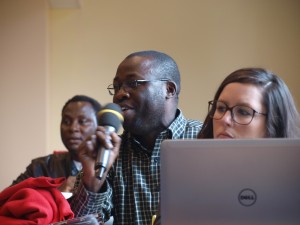
Is it better to train journalists locally, in Africa, or to bring them to Europe for instance ?
Short term you can have a greater impact and reach more people if you train journalists locally, says Picard. On the contrary, if your goal is a more advanced training, then it makes more sense to have African journalists be trained in developed countries.
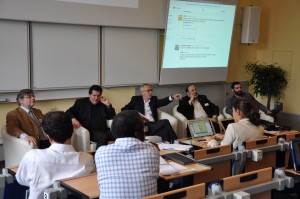
Faustino specifies that media management training is certainly needed, but there are different levels of need. Some countries require training concerning in organizational development; some other countries need strategic management training. What is the point to teach market strategies in countries where there is no market, when the media are totally dependent on government subsidies? According to Faustino, it is necessary to first understand the influence of the political context and distinguish among four main types of countries in Africa: (a) developed countries but with little resources, (b) developed countries with a lot of resources and the presence of a media market, (c) poor but democratic countries with some resources, and (d) poor and non-democratic countries with little resources such as Guinea Bissau.
Michael Serwornoo, doctoral student at Dortmund University in Germany and coming from Ghana, argues that the problem is how you fulfill the needs in Africa. There is a European way, however is that appropriate? The European media system is different from the African one. In Africa local language broadcasting is acquiring importance and breadth, the most successful radio station reaching 10 million listeners in Ghana is broadcast in local language. So an important QUESTION is how do you manage local language broadcasting efficiently and more professionally ? This type of broadcasting is not typical European … Serwornoo continues saying that he was running a campus based radio station, which was doing very well because he could count on a group of people with great managerial competence “Management competence is what we lack the most in Africa”, he says.
Serwornoo is addressing the issue of how do you adjust to change, and that takes strategic thinking, says Picard. That thinking requires managerial thinking which gives you ways to address your problems and figure out what you need to be doing to solve them. So a lot of the management training is not technique but mindset. Faustino adds that European Institutions need to be sensitized to promote and support media management training in Africa.
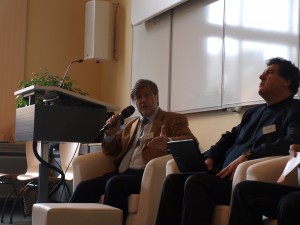
Jean Marie Etter follows on Serwornoo’s point on local language media precising that all radios that have been created by the Hirondelle Foundation are broadcast in local languages, the staff is local and content is produced to address local people. He further asks Serwornoo what lessons he will bring back to Africa once he will finish his PhD in Germany. Serwornoo answers that going back to Ghana he will make sure that more practice is put into journalism programs at university as it is done in Dortmund. According to him programs in Africa are far too theoretical and more training is needed at university level. Abiodun Salawu, a Nigerian professor at North-West University in South Africa, concludes by saying that education in media management is provided in a number of African countries.
Discussion Panel
Financing of media development in Africa, what challenges?
Panelists
- Patrice Schneider, Media Development Investment Fund, Switzerland
- Philippe Couve, Samsa.fr, France
- Sylvain Béletre, Balancingact_Africa.com, France
- Tonnie Iredia, Nasarawa State University, Nigeria
QUESTION
How does the Media Development Investment Fund finance media development?
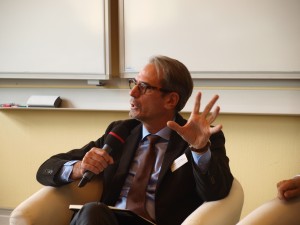
Patrice Schneider, chief strategy officer at the Media Development Investment Fund, opens by saying that its organization, started 20 years ago, has always believed in the market to finance independent media in emerging democracies: “So far we have invested $ 120 million in 31 countries, places where there is a history of media oppression – even if we don’t work in volatile environments as the Fondation Hirondelle does. We have $ 42 million invested in 35 companies that are trying to be change agents in their country. Of that portfolio $ 11 million is in Africa: Nigeria, Zambia, Zimbabwe, Lesotho and South Africa. We have been working with TV, radio and newspapers so far. However, the world is changing, so for the next 20 years we believe in something we call social change driven by digital acceleration. To address future challenges we are thus looking at the intersection between three things: (1) the virtual circle – if independent media can start to bloom then the virtual circle will work, (2) market consumption – in South Africa supermarket consumption is going up, that means that advertising will increase, (3) digital acceleration – today we can see a continent going from no internet connection to millions of connections very rapidly”.
QUESTION
What is the revenue model of the national public television in Nigeria, and what are the challenges?
Tonnie Iredia, former general director of the national public service television broadcaster in Nigeria, argues that the market has become aggressive and the collection of revenues has become harder, even for the public service media. The main revenue source
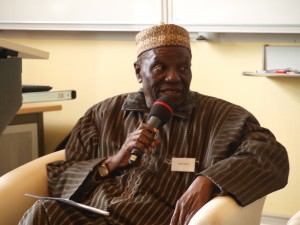
is represented by subventions, the second is advertising, he says. Then revenues come also from co-productions. The broadcasting organization of Nigeria, an association which includes both public and private broadcasters, promotes collaboration that generates revenues. Further contributions to the public service TV come from other bodies such as the World Bank (which provides 75% of the funding for the educational programs for children), as well as from the renting of facilities. Iredia adds that the national public service broadcaster in Nigeria further uses barter transactions as financial mean: “we look for facilities for which we don’t have to pay for, for instance we get cars in exchange of advertising”. However, government subventions remain the main source of revenue and the irregularity of payments by the government is sometimes creating serious difficulties to pay salaries. Ownership control is a further challenge, which is linked more to the people in the corridors of power, i.e. the intermediaries between the company and the government (the owner). Iredia further points out that the Nigerian public service broadcaster has always been putting a lot of importance and effort into the training of its staff. The challenge is that young journalists seem to pay more attention to allowances than to the training content. His solution to stimulate attention to training and enhance learning was to give anyone who went on training the duty to train another person. If people are not adequately trained, he argues, you have difficulties in making plans for leadership succession, as well as in having people with adequate expertise with regard to new technologies.
QUESTION
How does Samsa.fr contribute to media development and sustainability?
One way to address media sustainability is also to empower people willing to engage in media development and become entrepreneurs, and we do that by transferring the know-how that we esteem necessary to run media firms in the future, says Philippe Couve – founder of Samsa.fr.
Couve has a wide experience in digital training in Africa.
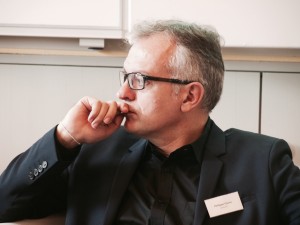
He launched Mondoblog.org, a platform to train people to blog, which today counts 600 bloggers writing about any possible subject that they considered as important. Samsa.fr runs a lot of other projects in Africa, one of these in collaboration with the French Agency for Media Cooperation, Le Monde Afrique and l’Agence France Press. It is called Innovation Afrique and aims at helping people innovate and create the information products of today: “We organized Hackathon days – media marathons that last for a weekend – in Dakar, Abidjan, Antananarivo, Casablanca, Alger and Tunis” says Couve, “this way we got in touch with a lot of people, interested in new media and the issue of information diffusion. At the same time we launched a 12 weeks-long MOOC (massive open online course) dedicated to training for web journalists, and web/mobile developers. 200 people followed the MOOC until the end, we will now help them to develop innovation projects and present them at a pan-African competition. This competition, organized by Code4Africa, will reward 20 projects with 1 million dollars and one year international coaching to turn the projects into startup companies”.
QUESTION
What is the point of view of Balancing Act ?
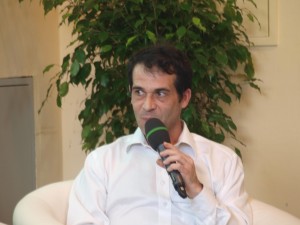
According to Sylvain Béletre, senior researcher at Balancing Act, digital transformation, appropriate training and technology implementation as well as the creation of quality content represent the main challenges for media firms in Africa and that mostly require financing. This is confirmed by the requests that Balancing Act receives from media and telecommunication companies, their clients. Clearly though, distinctions need to be made as there are three Africas, the northern part, the sub-saharan Africa and then the cities that represent the most developed part of Africa, Béletre says.
Question: Are there other funds such as the MDIF around the world? And how do you make sure that the media you invest in remain independent along the way?
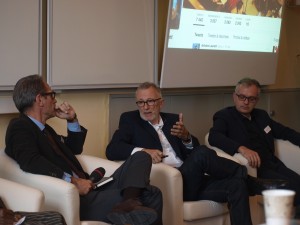
Unfortunately we are the only fund of this type operating in the media sector, says Patrice Schneider, although there is a great need for organizations helping media firms being independent from political parties and from governments. In order to make sure that media stay independent the first guarantee is represented by the board of directors, which is made of journalists and/or human rights activists. In one of the boards we have the founder of Human Rights Watch. Second, we don’t finance start-ups, because we want to check what kind of content media firms have published during at least the previous two years. Then we have 9 specific criteria that we use to conduct our due diligence. Further, if we see that there is a substantial change in the content that the media publish, we can rescind the contract. In any case what helps us the most to manage all that is 20 years of our experience.
Question: Who do you finance in Nigeria and why?
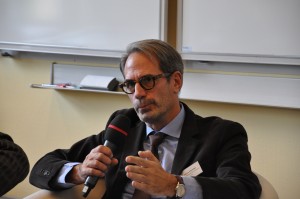 As the traditional media business model is under attack everywhere, 3 years ago we have decided to create a new $ 3 million fund to invest in digital media. In Nigeria we have thus invested in a digital news outlet called Sahara Reporter, which is not making high volumes but is close to profitability and thus showing to the whole world that digital investigative journalism can work.
As the traditional media business model is under attack everywhere, 3 years ago we have decided to create a new $ 3 million fund to invest in digital media. In Nigeria we have thus invested in a digital news outlet called Sahara Reporter, which is not making high volumes but is close to profitability and thus showing to the whole world that digital investigative journalism can work.
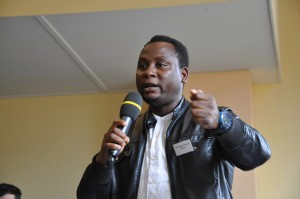
Question: Many Nigerians would say that Sahara Reporter is affiliated with the opposition, what do you think about that?
We could have an hour debate on that. However, I bet that if the opposition would be at the government, they wouldn’t like Sahara Reporter anymore.
Question: With which amounts and interest rates do you finance media, and do you participate in the companies you finance?
We give loans that go from 1 up to 5 million US dollars. If we participate in the companies that we fund, it is always with minority participations. Our interest rates vary between 2% and 9% depending on the country. We don’t want to break the market but to provide affordable financing at the same time, says Schneider.
Question: How do you see the link between the digital training that you provide and the employability of the people you train in traditional media?
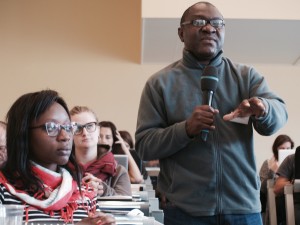
First of all we need to recall that countries such as Ghana, Nigeria and Kenya are sufficiently developed to allow innovative media projects to emerge, while in most of the French-speaking countries this is not the case, says Couve. This explains the need for digital training. The goal of Samsa.fr, once people are trained, is to put them in contact with people such as Patrice Schneider and similar organizations in order to make people’s projects possibly develop into economically viable media start-ups. As to traditional media, they will have to transform themselves, embrace the new digital environment or they will disappear, adds Couve, “I thus prefer to train people that wish to launch themselves in innovative media, which already are the media of today, rather than to train people for traditional media that don’t have a future”. This somehow answers a question that Robert Picard posed at the beginning of the conference: is it useful to support media that are fading in developed countries?
According to Tonnie Iredia, the MDIF seem to invest in media that attack governments, thus in adversarial journalism rather than in developmental journalism. For Iredia media should develop in a balanced way ensuring objective journalism. For this purpose, if on one hand financial capital is fundamental, on the other hand we should not forget the importance of managing human capital: training people but also motivate them so that they can sufficiently have satisfaction at work is fundamental to ensure professional journalism.
Keynote
Local and global media: working at cross-purposes
Stephen Smith, Duke University, USA
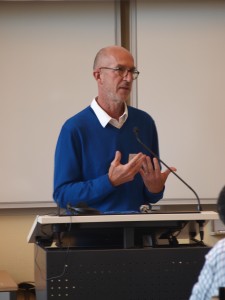
On account of a set of normative assumptions revolving around the Fourth Estate, the interactions between global and local media are generally posited symbiotic. However, according to Stephen Smith, a reading against the grain lays bare many instances where they actually work at cross-purposes: in unfair competition, international media are “poaching” local talent in Africa; their coverage of the continent favors a Pan-African view at the expense of more diverse, national trajectories – a bias that heavily distorts the image of post-Cold War Africa; crucially, African audiences are swamped with “aggregating” international views, which drown out “disaggregating” local news, because dominant media organizations funded by foreign taxpayers such as the BBC, RFI, the Voice of America or China Radio International are accessed for free; such predatory pricing – “dumping” – not only stymies the development of African media but, now that the continent’s mobile telephone networks reach the tipping point of 4G quality, which allows easy access to the Internet, entails a massive risk of alienation, of “complimentary colonization” by foreign soft power.
A more critical understanding of the relationship between global and African media would be mutually beneficial, says Smith. Through the lens of Africa’s synthesis of elsewhere successive temporalities – Ernst Bloch’s “Gleichzeitigkeit des Ungleichzeitigen” – the outside world could re-interrogate its assumptions centered on the Forth Estate, the role of “free” media in and for democracies, the public or private funding of its press, or the widening gulf between public and published opinion. Thus, journalistic solidarity without borders might become more than a questionable postulate.
Discussion Panel
Media investment strategies and independence of the press
Panelists
- Sophie Guignard, Groupe Le Monde, France
- Emmanuel Biney, Infrastructure specialist, Ghana/UK
- Stephen Smith, Duke University, USA
QUESTION: Is Africa really the next big thing for European Media?
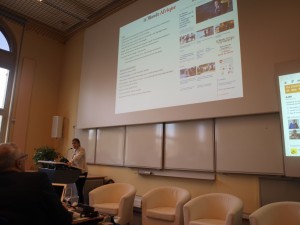
It is not a must to go to Africa, but for the Le Monde it makes sense. It is a strategic move because Africa is a growth market for us, says Sophie Guignard. Le Monde is not expect a lot of money from its African operations but to expand its audience and cover the costs.
For Biney there is indeed a huge market in Africa for media companies coming from developed countries. However, he specifies, you need to know the territory very well. Excellence in Africa is based on whom you know and what you know. If you ignore how we operate you cannot succeed, says Biney, who adds that Richard Branson had to exit the airline market in Ghana.
Smith agrees and adds the advice of the old Ivorian president who said “never go to a village without knowing someone that is already known by the village”. Make sure that you engage with the right people and ask yourself how useful it is what you are doing, says Smith. African population will be the only young one around in the future, and young people have an immense desire to be educated, to have 4G mobile phones. So the potential is there, the difficulty lies in the fact that you are being judged for how long you have been around. Smith recalls what Robin Lingg of Ringier said about their expansion in Africa and, being Africa a very special place, he finds their decision to take 2 years just to learn how things work a very good strategy.
QUESTION: Who are the big players coming into Africa now and who is the most clever?
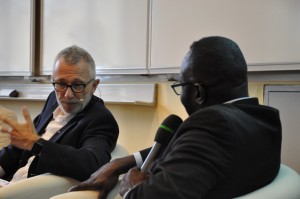
There are a lot of big players coming into Africa, Vodafone for instance is huge, clever but not smart. They play by the books but academic sense is different from street sense, and to succeed in Africa you need to know both, says Biney. BBC and CNN are present since a long time with free to view, but pay to view on the side, too. They are smart. Another important thing to keep in mind is that Africa has a community-based culture. Taking responsibility for the community is key for those who want to invest in Africa. Startimes is investing a lot in DTT2 technology. Are they smart? Not smart, say Biney.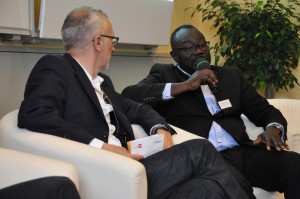 They wanted to build the whole infrastructure, sell the set top boxes, and be the broadcaster too. You can’t have it all.
They wanted to build the whole infrastructure, sell the set top boxes, and be the broadcaster too. You can’t have it all.
Smith adds that for sure it is easy to open a window on Africa without touching base. LeMonde works in Africa with Africans so they went already a step forward and probably are a hybrid. If you set up operations in Africa is more difficult. However, when you work by yourself for Africa it might work well. It has been the case for Chinese who have moved from China to Africa to improve their lives. They engaged with African reality and made it. Theirs is an important story, an entrepreneurial story, says Smith. They are cultivating land in Africa, something in which Europeans or American would not engage in.
Biney however adds that the Indians, another big community of foreigners, when engaging in media they would do it with 80% of local content and employing local manpower. Chinese don’t do that, on the contrary it is the other way round. We have 3 levels of powers in Africa: the political power, the royal power (still strong especially in Ghana) and the community power. Understanding what communities are looking for makes companies successful.
QUESTION: Does Le Monde collaborate with African local media?
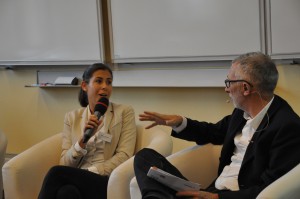
First of all we need to recall that Le Monde is present in Africa only online. The African project is very old and the first idea was to have a paper edition there. Then we looked at figures – very small circulation for the main newspapers such as 30/40.000 copies for l’Oservatuer for instance – we realized that the online edition was the only viable option, says Sophie Guignard. Le Monde Afrique has a wide audience in France, people interested by African news, so we are also satisfying the needs of our French audience. In terms of collaboration, we prefer to work with bloggers who are more dynamic and independent than with established local media. With them collaborations are occasional in particular cases such as elections for instance. We would like to partner or even acquire local media if there some independent media with a viable business model would exist. At the moment we don’t have money to invest, says Guignard, we need to systematically look for the money to fund our projects and operations.
QUESTION: is there an independent press in Africa?
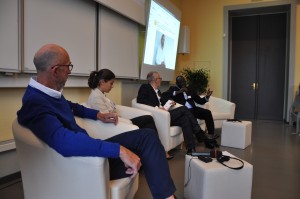
Yes, says Biney, there is. If you take Multi TV for instance, they have 10 radio stations, satellite TV, digital TV as well as multiplex licenses: for those you need to respect specific independence criteria before you get them. Local media are partnering with Multi TV and contributing to its independence.
For Guignard it is however difficult to find an independent media which also has a sustainable business model. Independence is very expensive. That is why for the moment Le Monde prefers to work with African media but not to get engaged business wise yet. Smith specifies that there are different traditions in the different parts of Africa: in the English-speaking countries there are sizes that allow economies of scale, in French-speaking countries things work differently. There France was a power through out the cold war, and the main media were and sometime still are based in France – Jeune Afrique for instance – that is why in those countries there is not much to buy now.
QUESTION: Why don’t we import more African content ?
Le Monde is buying African content, says Guignard. The newspaper employs 20 African freelancers at the moment and wishes to expand in the near future. One factor limiting the expansion and the recruitment of African staff is the lack of competence in web and economic journalism. We are trying to work on finding training solutions.
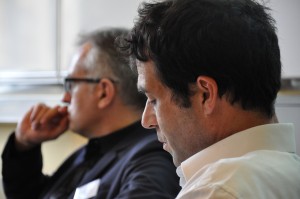
Sylvain Béletre recalls that talking content, one of the major problems has been the rarity of general interest African content in the past. Now the situation is changing and the volume of African content that is being exported is exploding. Transactions of African programs have been increasing from $ 1 million to $ 1 billion. Another problem is that there are not many content production studios in Africa, there are some in South Africa and in the Norther part of Africa, otherwise a lot of content is produced so local that you cannot sell it. Apart from that Nigeria is doing very well with Nollywood, producing quality movies that are presented also at a festival in Paris each year, translated in French and distributed as paid content via a company called Théma. You can get the African package for $ 5-10 a month. African content is enormously being exported to the UK and USA. Also the situation for content producers is improving within Africa, too. Beforehand the national broadcasters were not paying producers for the content they broadcasted. Now the government is recognizing that there is a need for quality content and has started to pay for it.
Broadcast is casted broad, says Biney. When dealing with content, quality and format of content are important but thinking about which is the destination of the content is paramount. Further, content is content, and surely there is a lot of content produced in Africa that people abroad would love to watch, so a lot of business can be done in the future around content production.
To answer to a question from the audience, Sophie Guignard adds that Le Monde Afrique isn’t there to provide help but to do business, develop things. “We think there is a demand and that we have a card to play there”, she says.
Jean Marie Etter, Director of the Hirondelle Foundation concludes the conference by thanking the organizers and hoping that the discussion will continue and another event of this kind will be organized soon again.
